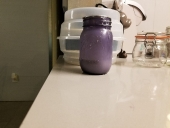Hi Adam,
For a sensitive stomach I would suggest a yogurt recipe developed by Elaine Gottschall in her book Braking the Vicious Cycle. They found that fermenting at 100-110 deg F for 24 hours produces a virtually lactose-free yogurt. This is because the longer a starter sits with milk, for more it brakes down lactose. So at 24 hours the lactose is broken down into its components of glucose and galactose. In other words, the digestion of lactose has been done for you! This long of a culture time also starts to brake down some milk proteins which means overall east of digestion for this yogurt.
Another consideration is that some folks don't handle the milk protein called casein. In that case you can try goat milk instead of cows milk. If that stilll doesn't work then try non-dairy milks but I'd say away from store bought soy or almond milk. Most have additives that interfere with the fermentation process.



